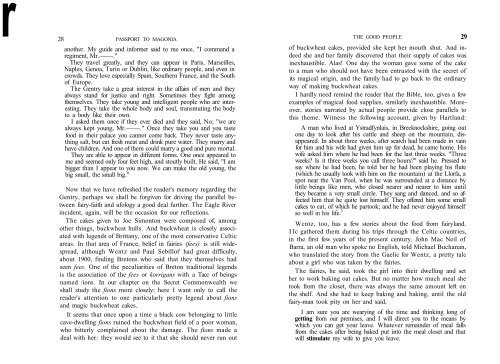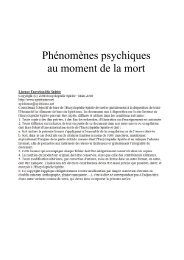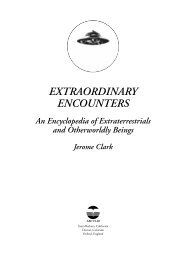You also want an ePaper? Increase the reach of your titles
YUMPU automatically turns print PDFs into web optimized ePapers that Google loves.
28<br />
PASSPORT TO MAGONIA<br />
another. My guide and informer said to me once, "I command a<br />
regiment, Mr. ."<br />
They travel greatly, and they can appear in Paris, Marseilles,<br />
Naples, Genoa, Turin or Dublin, like ordinary people, and even in<br />
crowds. They love especially Spain, Southern France, and the South<br />
of Europe.<br />
The Gentry take a great interest in the affairs of men and they<br />
always stand for justice and right. Sometimes they fight among<br />
themselves. They take young and intelligent people who are interesting.<br />
They take the whole body and soul, transmuting the body<br />
to a body like their own.<br />
I asked them once if they ever died and they said, No; "we are<br />
always kept young, Mr. ." Once they take you and you taste<br />
food in their palace you cannot come back. They never taste anything<br />
salt, but eat fresh meat and drink pure water. They marry and<br />
have children. And one of them could marry a good and pure mortal.<br />
They are able to appear in different forms. One once appeared to<br />
me and seemed only four feet high, and stoutly built. He said, "I am<br />
bigger than I appear to you now. We can make the old young, the<br />
big small, the small big."<br />
Now that we have refreshed the reader's memory regarding the<br />
Gentry, perhaps we shall be forgiven for driving the parallel between<br />
fairy-faith and ufology a good deal further. The Eagle River<br />
incident, again, will be the occasion for our reflections.<br />
The cakes given to Joe Simonton were composed of, among<br />
other things, buckwheat hulls. And buckwheat is closely associated<br />
with legends of Brittany, one of the most conservative Celtic<br />
areas. In that area of France, belief in fairies (fees) is still widespread,<br />
although Wentz and Paul Sebillot' had great difficulty,<br />
about 1900, finding Bretons who said that they themselves had<br />
seen fees. One of the peculiarities of Breton traditional legends<br />
is the association of the fees or korrigans with a Tacc of beings<br />
named /ions. In our chapter on the Secret Commonwealth we<br />
shall study the fions more closely; here I want only to call the<br />
reader's attention to one particularly pretty legend about fions<br />
and magic buckwheat cakes.<br />
It seems that once upon a time a black cow belonging to little<br />
cave-dwelling fions ruined the buckwheat field of a poor woman,<br />
who bitterly complained about the damage. The fions made a<br />
deal with her: they would see to it that she should never run out<br />
THE GOOD PEOPLE 29<br />
of buckwheat cakes, provided she kept her mouth shut. And indeed<br />
she and her family discovered that their supply of cakes was<br />
inexhaustible. Alas! One day the woman gave some of the cake<br />
to a man who should not have been entrusted with the secret of<br />
its magical origin, and the family had to go back to the ordinary<br />
way of making buckwheat cakes.<br />
I hardly need remind the reader that the Bible, too, gives a few<br />
examples of magical food supplies, similarly inexhaustible. Moreover,<br />
stories narrated by actual people provide close parallels to<br />
this theme. Witness the following account, given by Hartland:<br />
A man who lived at Ystradfynlais, in Brecknockshire, going out<br />
one day to look after his cattle and sheep on the mountain, disappeared.<br />
In about three weeks, after search had been made in vain<br />
for him and his wife had given him up for dead, he came home. His<br />
wife asked him where he had been for the last three weeks. "Three<br />
weeks? Is it three weeks you call three hours?" said he. Pressed to<br />
say where he had been, he told her he had been playing his flute<br />
(which he usually took with him on the mountain) at the Llorfa, a<br />
spot near the Van Pool, when he was surrounded at a distance by<br />
little beings like men, who closed nearer and nearer to him until<br />
they became a very small circle. They sang and danced, and so affected<br />
him that he quite lost himself. They offered him some small<br />
cakes to eat, of which he partook; and he had never enjoyed himself<br />
so well in his life. 3<br />
Wcntz, too, has a few stories about the food from fairyland.<br />
I Ic gathered them during his trips through the Celtic countries,<br />
in the first few years of the present century. John Mac Neil of<br />
Barra, an old man who spoke no English, told Michael Buchanan,<br />
who translated the story from the Gaelic for Wentz, a pretty talc<br />
about a girl who was taken by the fairies.<br />
The fairies, he said, took the girl into their dwelling and set<br />
her to work baking oat cakes. But no matter how much meal she<br />
took from the closet, there was always the same amount left on<br />
the shelf. And she had to keep baking and baking, until the old<br />
fairy-man took pity on her and said,<br />
I am sure you are wearying of the time and thinking long of<br />
getting from our premises, and I will direct you to the means by<br />
which you can get your leave. Whatever remainder of meal falls<br />
from the cakes after being baked put into the meal closet and that<br />
will stimulate my wife to give you leave.





